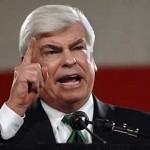Jury Still Out on Dodd's Financial Reforms
 Even if today's good stock market performance continues, it shouldn’t be taken as a sign of Wall Street's collective affection for Dodd’s financial regulatory reform legislation.
Even if today's good stock market performance continues, it shouldn’t be taken as a sign of Wall Street's collective affection for Dodd’s financial regulatory reform legislation.
Chris Dodd’s financial regulatory bill has passed the Senate and, with a few tweaks in conference committee, seems likely to become law. Nobody (including me) has read the entire bill’s final text yet and, as the details and consequences of the law become clear over the next few weeks, political forces on all sides will offer well and ill-informed opinions about it. Much could change in a version that’s signed into law. Observers, looking for a reasoned debate over the bill, however, should remember three things:
- Significant reform was necessary and inevitable: In the wake of the Great Depression, massive new restrictions on financial firms organizational forms and activities became the law of the land and remained in place for almost a half century. Their dismantling began in the 1970s and continued in a piecemeal fashion through the 1990s. But legacies of the industrial-era financial system designed by the Roosevelt administration and New Deal Congress remained in every corner of the economy. As a result, regulatory confusion reigned and made it easier for unethical, unwise, stupid, and criminal players to get away with their activities for longer than they should have. The system needed clarifications and change. Even if reform had not been necessary, the understandable public outrage over the financial system’s collapse meant that Congress had little choice but as to pass something that, at minimum, appeared sweeping and important. Republicans’ decision to negotiate and deal with the bill made sense: something was going to pass.
- Many of the most talked about aspects of the bill consolidate powers that the government already had; the debate over the wisdom of these existing powers per se never really took place: The single most talked-about aspect of the legislation, the creation of a new Consumer Financial Protection Bureau within the Federal Reserve, isn’t necessarily that big a deal. Although things still could change, most of the powers delegated to the new CFPB (called an “agency “in the House bill) aren’t new; only the structure is. Only one major, altogether new type of financial regulation—oversight of derivatives markets—will come out of the legislation. Many provisions just move around and modify existing powers. Surprisingly little debate took place on exactly what those powers should be and what the ideal group of powers would be.
- Today’s market rally is probably more a sign of relief than anything else: Proponents and opponents of financial regulatory measures love to look at stock market performance as a barometer of the market’s collective wisdom on the reforms. Deciding that the market likes the reforms on the basis of today’s rally is unwise. Many market players, particularly financial firms, really just want regulatory certainty; so long as they know the rules of the road, they’ll figure out how to make money. Even if good stock market performance continues—and in light of what appears to be an ever-strengthening recovery, it probably will—it shouldn’t be taken as a sign of the market’s collective affection for Dodd’s reforms.